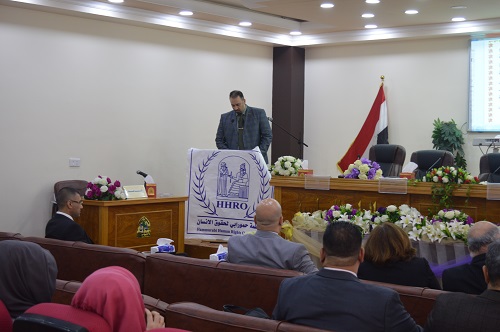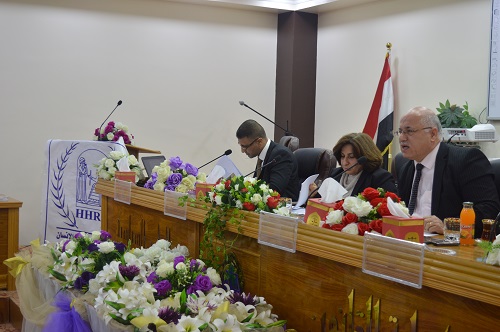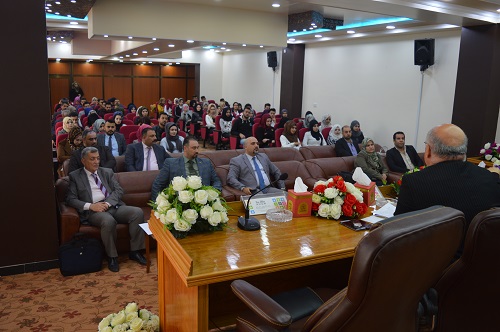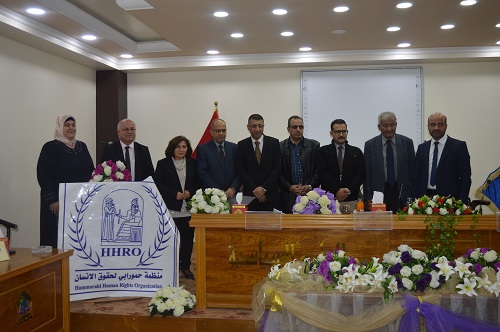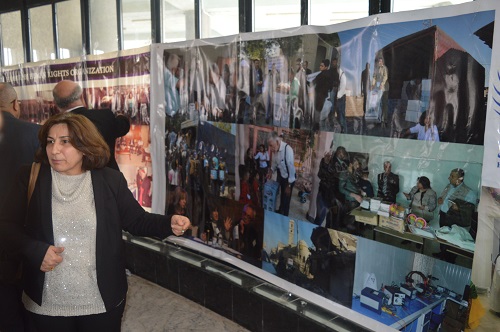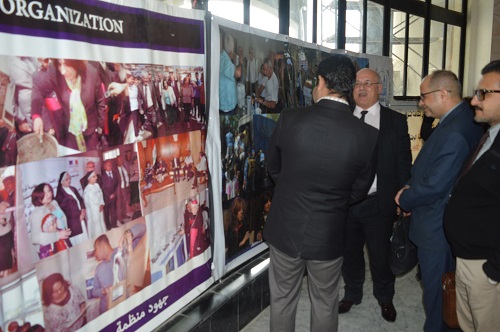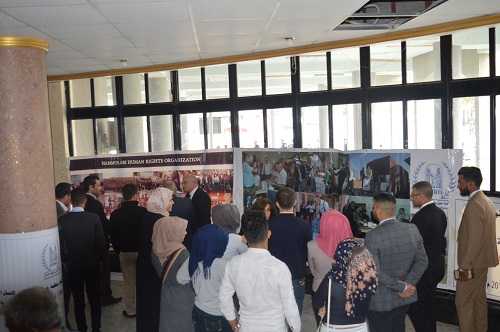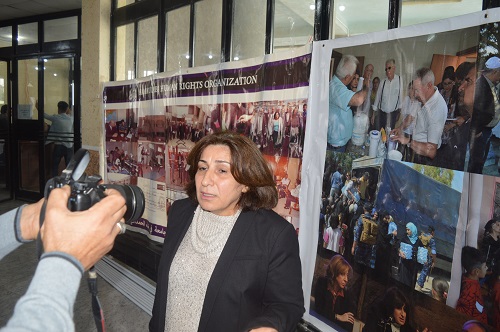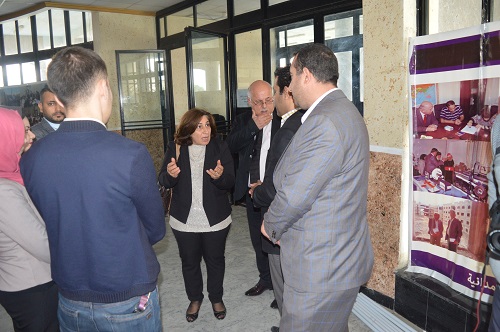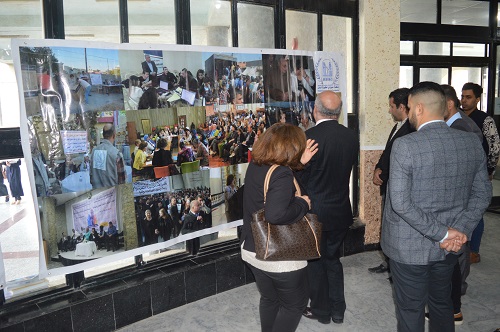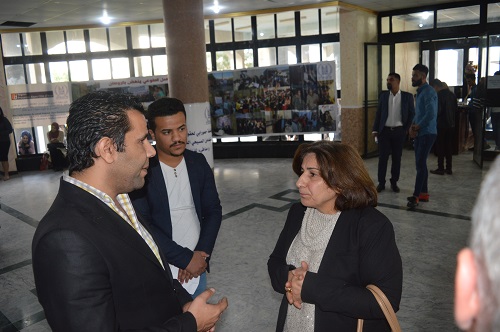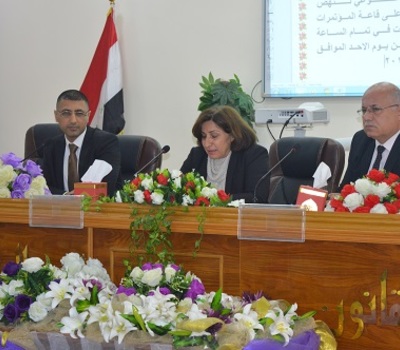
- The symposium was entitled "Volunteering Promotes the homeland", in which Mrs. Pascale Warda and Mr. William Warda spoke
- The activity of Hammurabi Human Rights Organization included a photographic exhibition on some of the organization's human rights and relief efforts
- Emphasizing the human rights standards, voluntary approach representing efforts of humanitarian, cultural and value
- Dr. Bashar Al-Saedi conducted the symposium assuming the logistical preparations required by this field activity
Hammurabi Human Rights Organization organized a human rights activity in cooperation with the Faculty of Law and Political Science at Iraqi University on Sunday 25/11/2018 including a symposium entitled "Volunteering Promotes the homeland".
The two key speakers were Mrs. Pascale Warda chairwoman of Hammurabi Human Rights Organization and Mr. William Warda Public Relations Officer of the organization.
The activities took place at the headquarters of the college included a photographic exhibition on some of human rights and relief efforts of Hammurabi organization in many Iraqi areas and was sponsored by Dr. Mohammed Hamid, Dean of the College and attended by the assistants Dr. Rosoul for scientific affairs and Dr. Mohamed Munther, Assistant of Administrative Affairs, Dr. Ziad Tariq, Head of Political Science Department, and Dr. Jamal Rapporteur of Political Science Department.
Dr. Bashar Sadoon Al-Saedi conducted the symposium, welcoming the guests, pointing out that the field cooperation between the Faculty of Law and Political Science at Iraqi University and Hammurabi Human Rights Organization is based on the structural partnership criteria between the academic institutions and civil society organizations. This approach has become a necessity that cannot be abandoned because it opens up to the scientific elites and human rights activists many of the pillars of the work that stems from the necessity of spreading knowledge in the fields of sustainable human development.
In her speech Mrs. Pascale Warda addressed a brief presentation of the historical basics of rights referring to the Universal Declaration of Human Rights on 10 December 1948, and the Vienna Program of Action adopted by the World Conference on Human Rights in 1993 which represent a qualitative transition along this path and a long-standing connection to the right human concepts to develop many lessons.
Mrs. Warda also addressed the great asset of human rights in Iraq, which is inherent in the cultural heritage of Mesopotamia saying that she is proud to find that there is a heritage global consensus of Iraq's possession of this assets prepared by Hammurabi (Father of laws).
Mrs. Warda also addressed the need to protect women's rights and put an end to the violations they are subjected to, stressing that women's rights should be a red line if democratic civil society is to be founded on equality, as well as the results of her visit to Britain several days ago at the invitation of three universities - Sussex, Cambridge and London – as noted by the academics, experts, intellectuals and their view of Iraq as an ancient civilization should be the basis for new premises serving this country.
Mr. William's lecture focused on volunteering as a culture and practice of ethical principle that cannot be shunned in any way. It also stems from the fact that the elite that speaks to it does not need to be defined by the axioms that the culture of volunteerism focuses, hence he focused on the moral vision, saying:
- In voluntary work we are in front of humanitarian structural opportunity to free ourselves from monotonous search for interests and not personal interests. It is true that the unemployed man cannot be asked for volunteer work and it is true that the student, the teacher and the professor are burdened with the activities required by his career, but trust that every one of us has losses, at the time he can gather at the moment designated to serve the work of others free of his will from the monotony that I mentioned to him. Mr. Warda added:
- According to my diagnosis, which I can defend its truth that we have not yet been able to complete the humanitarian conditions that are based on serving others as much as we serve ourselves and always look for others to hold them responsible for our shortening and negligence. This is why our accusations are directed at the municipal departments regarding the dirt, debris and waste in our neighborhoods and streets and do not have a voluntary approach to contributing to the risk of accumulation of these wastes as well as other negative aspects.
One of the facts that I have reached with my experience of human rights and with humility I say that we neglect the truth of human happiness, in the relationship with the other through volunteer work for the general human service and for the service of those who need this free service, therefore, the consensus of elites, intellectuals and human rights workers has now changed in favor of the reality and condition of the completion of human duties in the order of rights on him and in the forefront of the right to volunteer service to others, and I think it will not be long for these rights to be the consequences of the Universal Declaration of Human Rights.
Mr. Warda also referred to the activities of the International Red Cross and Red Crescent Organization, stressing that the approach of these two organizations is based on voluntary service, pointing out that there are more than 16 million volunteers a figure that is always increasable.
